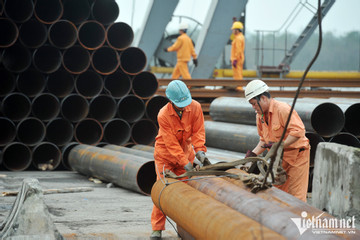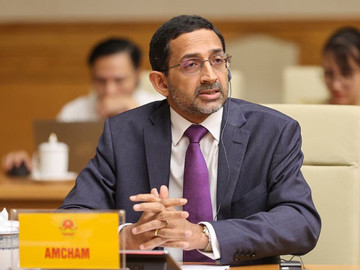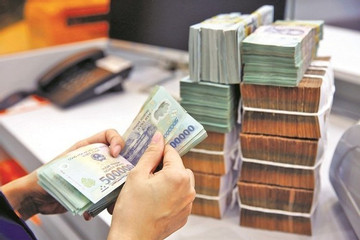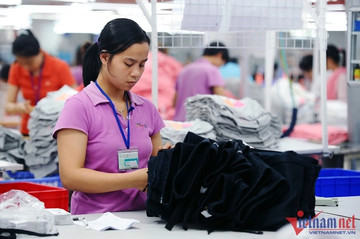- © Copyright of Vietnamnet Global.
- Tel: 024 3772 7988 Fax: (024) 37722734
- Email: evnn@vietnamnet.vn
vietnam economy
Update news vietnam economy
Conditions for Vietnam to become high-income country by 2045
GDP (gross domestic product) growth has slowed down. The risk of falling to the middle-income trap and economically lagging behind exist.
Vietnam builds strong credibility by enabling stable macroeconomic environment
Vietnam has built strong credibility by enabling a stable macroeconomic environment, high GDP growth, and low inflation, as well as fiscal prudence with one of the lowest Government debt-to-GDP ratios in the world.
WB Lead Country Economist: Viet Nam sees strong rebound, momentum remains strong
Vietnam has witnessed a strong rebound after last year’s COVID related slowdown, said World Bank (WB) Lead Country Economist and Program Leader for Equitable Growth, Finance and Institutions in Vietnam Andrea Coppola.
Moody’s upgrades Vietnam’s ratings to Ba2, outlook to stable
The Finance Ministry said on September 6 that Moody’s Investors Service has upgraded Vietnam’s long-term issuer and senior unsecured ratings to Ba2 from Ba3 and changed the outlook to stable from positive.
Vietnam must get rid of mindset of having “competitive advantage in labor costs”
Many Japanese businesses believe that Vietnam needs to get rid of the image of an assembly and outsourcing country by creating new technology industries to help solve society's challenges.
Vietnam is fifth most open economy in Asia
Vietnam ranks as the fifth most open economy in Asia out of 37 nations evaluated by Fitch Solutions in its Vietnam Trade & Investment Risk Report.
A 'miracle' for Vietnam to catch up with Thailand and Malaysia
In 2030, the income of Vietnamese is expected to be equal to that of Malaysia in 2007. Experts calculate that if Vietnam tries its best, it can catch up with Thailand and Malaysia, but it will still be far behind China and South Korea.
Businesses need orders as purchasing power in export markets falls
The increase in input costs plus the decline in demand in many large markets are posing challenges to businesses in the last months of the year.
Vietnam able to become new tiger in Asia: economist
Vietnam has the potential to become a new tiger in Asia, economist Brian Lee Shun Rong at Maybank - Malaysia's largest financial services group and the leading banking group in South East Asia – has reportedly said.
Vietnam, Southeast Asia find ways to rise amid difficulties
Vietnam and the Southeast Asian region have managed to maintain economic stability and growth despite COVID-19 and the Russia-Ukraine conflict, according to experts.
Utilising every opportunity to grow and overcome challenges
That is the message and guideline of Minister of Planning and Investment Nguyen Chi Dung at the national conference on how to sustainably develop.
Vietnam needs skilled workforce to become upper-middle-income economy by 2035: WB
Vietnam will need a skilled workforce to transform itself into an upper-middle-income economy by 2035, the World Bank has suggested in its recently-released report named “Taking Stock: Educate to Grow”.
Vietnam’s human resources and the fear of missing opportunities
The lack of many highly qualified human resources leads to low labor productivity, hindrances for production expansion, and meeting of customer demands, affecting overall business results.
Steep hills ahead for investors
Unprecedented global factors, rising interest rates, and inflation running record highs are hampering investors’ appetite, with those who seek higher yields pondering other novel investment channels.
Vietnam to benefit from large corporations’ capital relocations
Capital reallocation plans announced by multinational corporations will offer opportunities for Vietnam to attract foreign direct investment, experts said.
Flexible adjustment needed in growth economy
The economy continues to face new uncertainties, even after the first half year into the program on socio-economic recovery and development.
Vietnam’s GDP growth estimated at 6.42% in H1/2022
Vietnam’s economy is estimated to grow by 6.42% in the first half of 2022, higher than expected, heard a Government teleconference on July 4.
Binh Duong ranks first nationwide by GDP
The southern province of Binh Duong took the lead among Vietnam’s 63 provinces and cities in terms of gross domestic product (GDP) per capita in 2021, according to the latest data released by the General Statistics Office.
For sustained success, Vietnam should learn from the mistakes of others
Right now, Vietnam is full of promise. The recent ratings upgrade by S&P Global makes it likely that the country will be the next “rising star”, referring to the achievement of its first investment grade rating in the next few years.
Leaders urged to kick on with disbursement
Slow implementation of the national fiscal and monetary initiative is expected to dent economic growth, with legislators urging the government to soon review the policy to provide further assistance for enterprises and people.



















